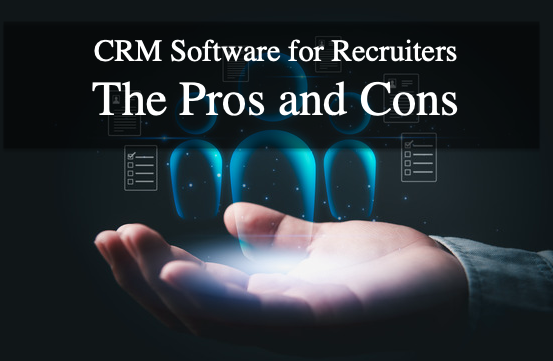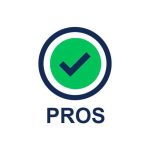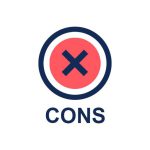 In the competitive world of recruitment, Customer Relationship Management (CRM) software has become a pivotal tool for managing interactions with candidates and clients. While CRM software offers numerous benefits to recruiters, drawbacks are also worth considering. This article explores the pros and cons of using CRM software for recruitment.
In the competitive world of recruitment, Customer Relationship Management (CRM) software has become a pivotal tool for managing interactions with candidates and clients. While CRM software offers numerous benefits to recruiters, drawbacks are also worth considering. This article explores the pros and cons of using CRM software for recruitment.
The adoption of CRM technology in recruitment reflects the broader digital transformation in the HR industry, aiming to streamline processes and improve outcomes. As the recruitment landscape continues to evolve, understanding the impact of CRM software is crucial for agencies looking to stay ahead of the curve. Balancing technology with human insight, recruiters can harness the full potential of CRM to enhance their operations while navigating its challenges.
★ If you want robust pm software with your CRM software to manage your projects better, consider our tool AceProject. Our pricing is not based on the number of users, which can save you a lot of money.
CRM Software for Recruiters: Top 5 Pros & Advantages

The advantages of integrating CRM software into recruitment processes are significant and multifaceted, touching on various aspects of the recruitment lifecycle. From enhancing candidate engagement to optimizing operational efficiency, the benefits underscore the transformative potential of CRM in the recruitment sector. Let’s delve into the five key pros that highlight why CRM software has become indispensable for recruiters aiming to excel in today’s competitive talent acquisition landscape.
1. Enhanced Candidate Experience
Creating a positive and memorable candidate experience is crucial in competitive talent acquisition. CRM software is pivotal in achieving this by allowing recruiters to maintain detailed and personalized interactions with each candidate. This level of personalization boosts the candidate’s satisfaction and fosters a positive perception of the recruiting firm.
- Personalized Communication: CRM enables the customization of communication based on the candidate’s profile, interests, and previous interactions, making them feel valued and understood.
- Timely Follow-ups: Automated reminders ensure that recruiters can promptly follow up with candidates, keeping them engaged and informed throughout the recruitment process.
- Candidate Journey Tracking: Recruiters can track and analyze the candidate’s journey, allowing them to identify and improve touchpoints that enhance the overall experience.
2. Improved Efficiency and Productivity
The ability to automate routine tasks is one of the most significant benefits of CRM software, leading to improved efficiency and productivity within recruitment teams. Automation frees up recruiters’ time, allowing them to focus on high-value activities, such as engaging directly with candidates and clients. The efficiency gained through automation directly translates into a higher throughput of placements and an enhanced ability to meet client needs swiftly.
- Automation of Routine Tasks: Email responses, candidate screening, and interview scheduling can be automated, significantly reducing manual effort.
- Centralized Database: A single, accessible database for all candidate information streamlines the search and placement process, making it faster and more efficient.
- Improved Task Management: CRM software enables better task management and prioritization, ensuring critical activities are completed on time.
3. Better Data Management and Analytics
CRM software offers robust data management and analytics capabilities, allowing recruitment agencies to harness the power of data in making informed decisions. With comprehensive insights into candidate sourcing, engagement metrics, and recruitment trends, agencies can refine their strategies for better outcomes.
- Centralized Data Storage: All candidate and client data is stored in one place, making it easier to access and manage.
- Analytics and Reporting: Advanced analytics tools within CRM systems provide valuable insights into performance metrics and trends.
- Strategic Decision Making: Data-driven insights enable recruiters to decide where to focus their efforts for the best return on investment.
4. Streamlined Communication
The facilitation of seamless communication is another key benefit of CRM software. By centralizing communication channels and ensuring that all team members have access to the same information, CRM systems help in maintaining a cohesive and informed recruitment process.
- Integrated Communication Tools: Email, instant messaging, and shared calendars within the CRM system enhance coordination among team members.
- Real-time Updates: Team members can receive real-time updates on candidate status and client interactions, ensuring everyone is on the same page.
- Collaborative Work Environment: CRM software promotes a collaborative work environment by facilitating information sharing and teamwork.
5. Enhanced Client Relationships
CRM software is instrumental in managing and nurturing relationships with clients. CRM systems provide a comprehensive view of all client interactions and preferences, enabling recruiters to deliver personalized service and maintain strong, ongoing relationships.
- Comprehensive Client Profiles: Detailed records of all interactions, preferences, and needs of clients are maintained, enabling personalized service.
- Automated Client Engagement: Automation tools can send regular updates, newsletters, and customized reports to clients, keeping them engaged and informed.
- Opportunity Management: CRM systems help identify and manage new business opportunities with existing clients through tracking and analyzing client needs and history.
CRM Software for Recruiters: Top 5 Cons & Disadvantages

While the benefits of CRM software in recruitment are undeniable, it’s equally important to consider the potential downsides of its adoption. These challenges can impact the recruitment process’s overall efficiency, cost, and personalization. Here, we will explore five critical cons of using CRM software for recruiters, shedding light on the complexities and considerations that must be navigated to ensure the technology serves as an asset rather than a hindrance.
1. High Initial Cost
Adopting CRM software often comes with a significant initial investment, which can be a substantial barrier for small to medium-sized recruitment agencies. This cost not only includes the price of the software itself but also the expenses related to implementation, training, and potential customization to fit specific needs. For agencies operating on tight budgets, this financial outlay can be daunting and may deter them from leveraging the benefits of CRM technology.
- Licensing Fees: Purchasing licenses for CRM software can be expensive, especially for premium or enterprise-level solutions.
- Implementation Costs: Setting up the CRM system, including integrating existing systems and data migration, requires resources and expertise, adding to the overall expense.
- Training Expenses: Ensuring that the recruitment team is proficient in using the CRM software necessitates comprehensive training, which incurs additional costs.
This disadvantage could be resolved by opting for CRM solutions that offer scalable pricing models, allowing agencies to start with basic features and add more functionality as their budget allows. Additionally, seeking out CRM providers that offer robust support and training materials as part of their package can reduce the need for extensive external training, helping to mitigate some of the initial financial burden.
2. Learning Curve and Training Requirements
Implementing a new CRM system can be complex, often accompanied by a significant learning curve for recruitment teams. The intricacies of fully utilizing all CRM software features require comprehensive training and time, which can temporarily decrease productivity as staff adapt to the new system. This challenge is particularly pronounced in fast-paced recruitment environments where time is critical.
- Complexity of Features: Advanced CRM systems come with a wide range of features, some of which may be complex and not immediately intuitive to all users.
- Adjustment Period: Transitioning to a new CRM system can disrupt established workflows until users become proficient in the new software.
- Ongoing Training Needs: As CRM systems evolve with updates and new features, continuous learning and adaptation are required.
Recruitment agencies can implement a phased training approach to mitigate this disadvantage, starting with basic functionalities before gradually introducing more complex features. Additionally, selecting a CRM with solid customer support and user-friendly training resources can ease the transition, enabling staff to become proficient more quickly and efficiently.
3. Potential for Data Overload
With the vast amount of data CRM software can store and analyze, recruitment agencies may face data overload. Sifting through extensive databases to extract relevant insights and information can become time-consuming. Without proper data management strategies, the wealth of information can lead to analysis paralysis, where decision-making is hindered rather than helped.
- Difficulty in Data Filtering: Identifying relevant data from a vast pool of information can be challenging.
- Analysis Paralysis: Too much information can overwhelm decision-makers, making it hard to take decisive action.
- Maintaining Data Quality: Accumulating vast amounts of data requires rigorous data cleaning and management to ensure accuracy and relevance.
Agencies can overcome data overload by implementing data management best practices, such as regular data audits and establishing clear criteria for data analysis. Leveraging CRM features that offer advanced filtering and segmentation can also help focus on the most relevant information, making data more manageable and actionable.
4. Risk of Depersonalization
While improving efficiency, CRM software’s automation features carry the risk of depersonalizing the recruitment process. Over-reliance on automated communications and processes can make candidates feel like they are just another number in the system, potentially damaging the candidate experience and the agency’s brand.
- Overuse of Automation: Excessive reliance on automated emails and notifications can reduce personal interaction.
- Generic Communication: Standardized messages may fail to address candidates’ unique concerns or interests.
- Lack of Personal Touch: The recruitment process can become impersonal, diminishing the candidate’s engagement and connection with the agency.
Recruitment agencies can address this challenge by adopting a balanced automation approach, ensuring personalized communication is maintained for key interactions. Utilizing CRM data to personalize automated messages and scheduling regular personal check-ins can help maintain a personal touch while benefiting from automation efficiencies.
5. Dependence on Technology
Heavy reliance on CRM software introduces a dependency on technology, which can become a vulnerability if the system experiences downtime or data loss. Such technical issues can disrupt recruitment operations, delay processes, and potentially lead to the loss of valuable data.
- System Downtime: Technical glitches or maintenance can render the CRM system temporarily unusable.
- Data Security Risks: Storing sensitive candidate and client information in a CRM system introduces security concerns.
- Recovery Challenges: Recovering from data loss or corruption can be difficult and time-consuming, impacting operations.
To mitigate the risk of technology dependence, agencies should implement robust data backup and recovery procedures and ensure that their CRM provider offers reliable uptime and robust security measures. Additionally, having contingency plans for manual operations during system downtime can help minimize disruptions to recruitment activities.
Conclusion
CRM software for recruiters offers a range of benefits that can enhance the recruitment process, from improved candidate experiences to better data management. However, recruiters must also navigate the challenges associated with cost, learning curves, data management, personalization, and technology dependence. Careful consideration and strategic planning can help leverage the advantages of CRM software while minimizing its drawbacks.
Today, many project managers use tools, such as CRM software for recruiters or collaborative project management platforms, to facilitate effective communication within project teams. These tools streamline information sharing, enhance real-time collaboration, and provide a centralized hub for project updates.
Recommended article: Difference Between CRM Software & Help Desk Software
Leave A Comment